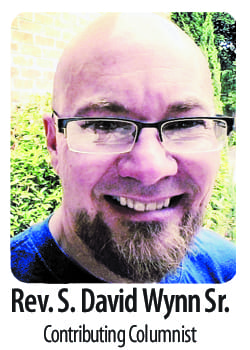
I was invited to capture what Pride means to me. For many that is an easy request. It means solidarity, social justice, becoming more visible, finding a voice, being with a larger community with a similar story to commiserate and celebrate.
 I remember my very first Pride parade many, many years ago in Austin. The thing I remember most is the continual unfolding of the sense of being “not alone.” It was wonderful. I felt more courageous in expressing my truth.
I remember my very first Pride parade many, many years ago in Austin. The thing I remember most is the continual unfolding of the sense of being “not alone.” It was wonderful. I felt more courageous in expressing my truth.
And yet, I can struggle. I struggle with special days set aside to really “be who we are,” or to “be recognized and celebrated.” It smacks a little of tokenism and I don’t want a day, I want every day, and I want that for every person — that steady trickle of acceptance, celebration, being seen and heard.
I want Pride to have a shelf life, for every group that finds themselves labeled in any way.
Poet David Whyte has written: “Courage is a word that tempts us to think outwardly, to run bravely against opposing fire, to do something under besieging circumstance, and perhaps, above all, to be seen to do it in public, to show courage; to be celebrated in story, rewarded with medals, given the accolade, but a look at its linguistic origins leads us in a more interior direction and toward its original template, the old Norman French, Coeur, or heart.
“Courage is the measure of our heartfelt participation with life, with another, with a community, a work, a future. To be courageous, is not necessarily to go anywhere or do anything except to make conscious those things we already feel deeply and then to live through the unending vulnerabilities of those consequences. To be courageous is to seat our feelings deeply in the body and in the world: to live up to and into the necessities of relationships that often already exist, with things we find we already care deeply about: with a person, a future, a possibility in society, or with an unknown that begs us on and always has begged us on. Whether we stay or whether we go — to be courageous is to stay close to the way we are made.”
For me Pride parades are an invitation to the much deeper soul work of “staying close to the way we are made,” and in so doing, getting closer to the way those around us are made. It’s a clarion call to relationship that is deep and vulnerable work.
Pride is an external, embodied ritual that will hopefully lead us to the internal ritual of recognizing our own beauty and worth. The challenging part is that it asks us not only to do that for ourselves and those who understand our stories because they share some piece of our story, but to also cast the net wider and see the same beauty and worth in those beyond our stories, including those who protest and want to suppress our stories.
The Pride event is a way to practice our courage, so that when we step away from that space into the larger space of the larger world we do so with our whole heart and “heartfelt participation with life, with another, with a community, a work, a future.” It takes great courage to live this way.
Stay close to the way you are made. Have courage. Happy Pride to all of creation in every day.
The Rev. S. David Wynn Sr. is lead pastor of Agape MCC Church in Fort Worth. He has a Masters of Theological Studies degree from Perkins School of Theology at Southern Methodist University in Dallas, and is a shamanic practitioner and reiki master.
FEEDBACK
Tents interfere with enjoying the parade
I really enjoyed the [2015 Alan Ross Texas Freedom] Parade, but it took a long time to find a spot to watch the parade because of the tents up and down the street allowing only their party — no matter how small — to see the parade.
This has gotten totally out of hand in the last couple of years. It doesn’t represent the message of inclusivity and equality of the parade when the city or the tavern owners guild allows people to claim space to see the parade.
Most people with tents weren’t even watching the parade. They were sitting around playing with their phones, playing beer pong, or the tents were almost completely empty but still had “do not enter” caution tape draped around their claimed space. I have a few pictures showing this.
I have never seen any other city allowing this during a parade. These are not the businesses that sent up the space between their business and the street I am addressing (to make a few extra bucks, which is also sleazy). Evidently anyone can set up a tent along the route and keep anyone else out as long as you show up early and have an obnoxious tent.
This is wrong.
Tom Cunningham, via email
This article appeared in the Dallas Voice print edition October 2, 2015.
Claiming Pride every day

